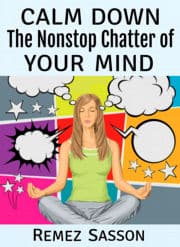
Often regarded as a mindfulness tactic, meditation is a practice where an individual is able to achieve focus in their mind. Through training, one can heighten their awareness and gain clarity and emotional calmness, reflecting a stable state.
Meditation has been proven by many studies to reduce stress, control anxiety levels, and even lengthen the attention span of practitioners.
The practice of meditational exercises has ancient roots and can be dated back to 1500 BCE.
Explore our online courses and eBooks on meditation, positive thinking, overcoming procrastination, motivation, affirmations, discipline, focus, and many more topics.
Many cultures and traditions offer their own style of meditation as it was often considered as a path towards attaining enlightenment and self-realization.
According to a sports and fitness report by Statista.com, the demand for yoga and meditation are rising in the US, and 12% of people surveyed stated that they would even be willing to study these disciplines online.
Another survey in 2018 reveals that as much as 51% of US millennials and 43% of US baby boomers indulge themselves in private meditation to recover from stressful events.
In light of this information, let us offer you some ways through which you can better concentrate on your meditation routines and get rid of distractions. So, let’s take a quick look at each one of them:
Meditation Tips for Beginners
1. Attitude Matters
Your attitude defines your zeal, level of understanding, and enthusiasm behind every action or task you commit yourself to.
Similarly, for meditation, you need the right attitude as well; otherwise, the whole regimen loses its meaning and offers negligible value in the end.
The right attitudes for meditation are never to strain yourself or be on a rush to expect things to happen quickly.
You neither need to cling on to something or reject yourself.
The best thing to do is to loosen up and relax. Meditation starts when you accept yourself as you indeed are but remain gentle and enjoy this journey that is intended to investigate your true self.
2. Creating a Routine
Our body learns better when we repeat actions. The brain learns to follow with a set routine, and this means that you need to develop a daily or regular practice, and the more you practice meditation, the better you will become with time.
Furthermore, establishing a routine also trains you to keep a particular time slot empty for your practice of meditation, and this comes with dedication and commitment.
By commitment, we mean your intent to meditate and not to be disturbed during such sessions.
Hence you would naturally plan your day in a way where during meditation you would avoid all distractions and disturbances consciously.
3. Emptying the Mind
Our minds are a warehouse of all the troubles. This is the place where a ton of ideas and notions run rampant.
For meditation, you need to empty your mind. Various techniques can help you empty your mind before meditation.
Our reactions to our beliefs that are depended on our thoughts and feelings cause an interaction.
When you stop reacting, you break the cycle, and eventually, with no further interactions, there can’t be any perceptions or interpretations to which we might get thoughts or feelings in us.
With no thoughts and feelings being instigated, you are gradually able to free up space in your head, and that is known as the empty mind.
4. Focusing Attention
Our brain has the ability to concentrate and bring any stimulus to our attention.
Many Buddhist, who are known as maestros of meditation, often practice selective attention by sustaining moment by moment focus on a chosen object. This could be the sound of their breathing or only a metronome sound.
To get your attention in the right-center, you can start by choosing a target and then zero in with your senses.
Simultaneously, it would be best if you also tried to calm your inner voice that can often cause distractions during this phase.
Lastly, the least of your concern should be a failure, remember you need more time, and shorter sessions are better during the beginning stages.
5. Finding the Right Community
There are many meditation communities across various neighborhoods; you need to find one. You can also go online and see what is being offered and when they are available.
Meditation communities are a blessing since they can offer you tons of improvements and facilitate you in every possible way to achieve inner peace.
6. Getting to Know Yourself
Nobody is born in this world knowing their own self.
Surely, we all have preferences and dislikes but that in itself are revealed to us when we first experience them on our own. Hence, meditation is a lesson in which you unravel your own mystery.
There are some core values inside all of us, and many life events that we go through teach us about them.
Our convictions and beliefs are hidden deep within ourselves, and through meditation, you can unveil them.
Identifying your own weaknesses and strengths is extremely important for all us. There is a famous saying that one can fool the entire world around them, but they can’t deceive the person looking back at them from the mirror.
7. Keeping Your Feelings in Check
We, as a human being, are a bundle full of emotions and feelings.
It is common that when we least want them, they run abundantly and freely throughout our existence.
One of the biggest distractions during meditation is disturbance from all of these unwanted feelings coursing through our minds and bodies.
Some of the best ways to keep feelings and emotions in check are by accepting them rather resisting them.
As a person. you should learn to forgive yourself and be grateful for the life that you have. There are millions of people in the world right now that have far less than what you have possession of.
8. Breathing Naturally
This is often an ongoing concern for beginners who consider breathing a far more critical interest than achieving mindfulness and self-awareness. Their notions often involve questions like what is the right way to breathe.
The correct answer is that you should never breathe unnaturally; in fact, you should breathe just as you usually do.
To encourage normal breathing through your meditational regime, breathe several times before starting. This will help you feel more grounded on the actual focus and objective behind the practice of meditation.
Experts advise keeping your mind off of such diversions as they are simply deviations from the actual practice of meditation.
9. Scanning Your Body
Another way to keep yourself from interrupted during meditation is to scan your own body.
See if you have any areas where you feel the emission of pain. Are you under any physical pain or is there an injury that you have sustained, which can cause your body to hurt?
Tending to your physical needs is like drinking water when you are thirsty or eating food when you are hungry.
Online Meditation Course: The Path to Awakening
Meditation techniques with guidance for finding inner peace, expanding consciousness, and awakening.
It is all a natural process. So, if you find any wounds, then the best thing to do is to apply corrective treatment for them. This way, you will follow the flow of nature and harmony.
10. Sitting Comfortably
Lastly, it is vital that when you meditate, you should never put yourself under any form of physical pressure or unwanted strain. Your muscles and your entire body should be relaxed, and there should be no tensions.
Always find the most comfortable position when you are preparing yourself to meditate. This will help you avoid the inconveniences of changing your body posture midway through your regime.
Every part of you should be at peace, and you must comfort your body during these practices.
Conclusion
There are various types of meditations, and each discipline has something truly unique to offer you. Some of the popular types include focused mantra, mindfulness, movement, and transcendental, to name a few.
We hope this post was able to offer you a better understanding of some of the ways through which you can meditate better without distractions.
About the Author
Amanda Jerelyn currently works as a Health Care Specialist at Crowd Writer. She is also a consultant at Dissertation Assistance where students can acquire cheap dissertation writing services UK from experts. She likes to indulge in watching popular culture movies and feature-length films to give herself a much-needed break from her busy schedules.

